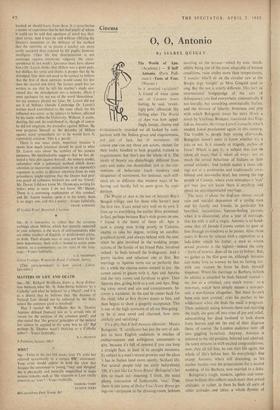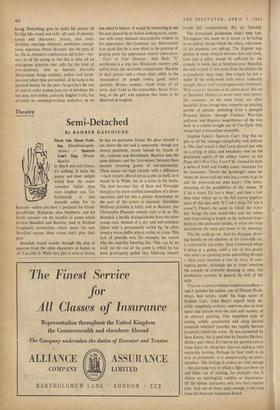Cinema
0, 0, Antonio
By ISABEL QUIGLY
The World of Apu. (Academy.) — II bell' Antonio. (Paris Pull- man.)—Taste of Fear. (Warner.) Is it inverted racialism? A friend of mine came out of Carmen Jones feeling, he said, 'revolt- ingly pale,' albinoish. My feeling after The World of Aim was how appal- lingly lumpy, clumsy and evolutionarily retarded we all looked by com- parison with the Indian grace and exquisiteness, not just of face, but of movement. Of course one can say those are actors, chosen for their looks, handled to look graceful, trained to exquisiteness; but that's not the whole of it. The ideals of beauty are disturbingly different from ours and make one dissatisfied; just as the con- ventions of behaviour (such modesty and eloquence of movement, for instance, such still- ness) arc so different that western ways of be- having can hardly fail to seem gross by com- parison.
The' World of Apt, is the last of Satyajit Ray's Bengali trilogy, and for those who haven't seen the first two, it can stand very well on its own. It lives up to everything the earlier films promised; in fact, perhaps because Ray's style grows on one, I found it the finest of them all. Apu is now a young man living poorly in Calcutta, unable to take his degree, writing an autobio- graphical novel, and always behind with the rent, when he gets involved in the -wedding prepa- rations of the family of his friend Pulu. Involved indeed : he finds himself the bridegroom. And a pretty tactless and reluctant one at first. But marriage to Apurna turns out so perfectly that for a while the cinema seems steeped in joy : the screen seems to gleam with it, Apu and Apurna and the very rooms and furniture to glow. Then Apurna dies, giving birth to a son, and Apu, fling- ing away novel and son and commitments, be- Conies a wanderer. In the end he comes back for the child, who at first throws stones at him, and then begins to show a gingerly acceptance. This is one of the high moments of all my film-going: . to be at once awed and charmed, how rare, unlikely and satisfying!
It's a pity that II bell'A morn() (director : Mauro Bolognini; 'X' certificate) has just the sort of sub- ject to have English audiences in stitches of embarrassment and ambiguous amusement—a pity, because it's, full of interest if you can keep a straight face, at least in its straight moments. Its subject is a man's sexual prowess and the place Et has in Italian (and more openly, Sicilian) life. Yet several people told me airily beforehand, 'Oh, it's just like La Norte Brava- (Bolognini's last film to reach us)—meaning. I think, the usual phony concoction of fashionable 'vice.' True, there i§ one scene of Dolce. Vita/None Brava go- ings-on---striptease in the drawing-room, lesbians nuzzling on the terrace—which by now. shock- ability being one of the most adaptable of human Conditions, raise smiles more than temperatures; 'I wonder who'll sit on the circular saw at the Borgia orgy tonight' as Miss Gingold used to sing. But the rest is utterly different. This isn't an international hodgepodge of the sort of delinquency you find everywhere, cinematically if not literally. but something unmistakably Italian, and the mixture of hilarity, bitterness and pity with which Bolognini treats his story (from a novel by Viteliano Brancati, translated into Eng- lish as Antonio, the Great Love0 is exactl■ w hat's needed. Local puzzlement again. in this country. The trouble is, people kept saying afterwards, Bolognini doesn't seem to know .whether it's a joke or not. Is it comedy or tragedy, pathos or farce? Which is just it: • a subject that can be taken all ways, that is taken all ways: • not so much the sexual behaviour of Italians as their sexual attitudes. And (which makes it more tell- ing) not at a proletarian and traditionally unin- hibited and neo-realist level, but among the top people of Catania, where even nowadays a 'nice' girl may just not know there is anything odd about an unconsummated marriage..
The story is about the disdrace, shame. social ruin and suicidal depression of a youlig man and his family and friends, in particular his horrified. incredulous, leprous-feeling parents, when it is discovered, after a year of marriage, that his wife is still a virgin. Antonio is so hand- some. that all female Catania comes to gaze at him through Its windows as he passes. After three years in Rome he returns with a reputation as a lady-killer which his father, a man to whom sexual prowess is the highest--indeed the only ----form of honour, does all he can to bolster. But, we gather as the film goes on, although Antonio can make love to women he has no feeling for, with any women he loves he finds himself impotent. When his marriage to Barbara (whom he adores) is annulled he finds himself treated — no, not as a criminal, very much worse: as a non-man, which here simply means a non-per- son, a non-human altogether. 'But there haven't been any men around,' cries his mother in be- wilderment when she finds the maid is pregnant. Then, suddenly seeing Antonio there and realising the truth, she goes off into cries of joy and relief, admonishing her dead husband to look down from heaven and see the end of their disgrace (here, of course, the London audience went off into giggling hysterics). Anyway,. Antonio is restored to his old position, beloved and admired, the town streams in with excited congratulations; now, they all tell him, he can start life again, the whole of life's before him. So everything's fine except Antonio, who's still dreaming, as his mother bustles over the preparations for a second wedding. of his Barbara, now married to a duke.
Bolognini's tough, modern, ageless and some- times brilliant film reflects much more than sexual attitudes: or rather, in them he finds all sorts of other attitudes and ideas, a whole flavour of
living. Everything goes to make his picture of Sicilian life round and rich: all sorts of plummy scenes and characters: priests, clan rami- fications, marriage alliances, ambitions, corrup- tions, nepotism. Pierre Brasseur has the part of his life as Antonio's rumbustious old father—out- size, as all his acting is; but this is after all an outrageous situation that calls for his kind of over-emphasis. And as Antonio Marcello Mastroianni brings subtlety, pathos and harsh- ness just where they are needed; all he lacks is the physical beauty for the part—he just isn't the sort of man to make women lean out of windows. He has nice, serviceable, curiously English looks, but certainly no swoon-provoking eyelashes, as we are asked to believe. It would be interesting to see the part played by an Italian-looking actor, some- one with every national characteristic evident in his appearance, like Gassman, say. Mastroianni is so good that he is now often in the position of playing parts his appearance almost contradicts.
Taste of Fear (director: Seth Holt; 'X' certificate) is a trip into Hitchcock country and suffers from the inevitable comparisons. Heroine in dark glasses and a wheel chair, shifts in the 'atmosphere' of people (who's good, who's sinister), Riviera scenery, visual tricks of all sorts; Ann Todd as the stepmother, Susan Stras- berg as the girl, and suspense that tends to be dissolved in laughter.







































 Previous page
Previous page